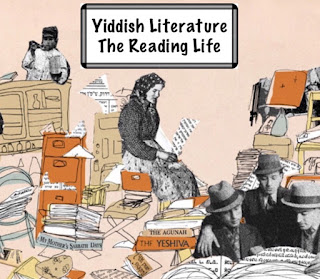The Brothers Ashkenazi by Israel Joshua Singer -1937 - translated 1980 by Joseph Singer, the author’s son.
1893 Bitgoraj, Poland
1919 to 1921 resides in Soviet Union
1936 - Moves to New York City
1937 - publishes in Yiddish The Brothers Ashkenazi, translated that same year into English, it was on The New York Times Best Seller list along with Gone With the Wind.
1944 - New York City
A few days ago I began to wonder why there are no books written in Yiddish on any “greatest novels” lists I have seen. For sure The Brothers Ashkenazi belongs on such a list as does The Letters of Menakhem-Mendl and Sheyne-Sheyndl by Sholem Aleichem. The most likely reason is that none of The many list makers have ever read not just these works but any Yiddish literature at all. There were never taught at the schools the list makers attended. Some of this must be attributed to simple prejudice, some to a Western European bias (I don’t recall ever seeing a Japanese or Indian novel on a list either). To this, maybe I will return to this topic later in the year) all i can say more is the pity.
Singer vividly captures ebb and flow of life in Poland’s second city, Lódz, focusing on Jewish Society as seen by events in the lives of two brothers.
We see the city go through numerous transformations, from sort of a giant shtetl where everyone knows each others business and tradition decides fates to a dynamic western industrial and trade powerhouse. Singer does just a wonderful job showing on Lódz were impacted by huge spocial transformations brought on my the Russian Revolution. In a brilliant comic interlude we see how people gradually develop the courage to mock the Czar. We see World War One sent many residents into Army never to return while others became rich from the war.
There just is so much in this novel, there are terrible pograms, workers strikes,
Police repression. At one point The Cossacks are brought in by White Russian forces to bring order.
One of the brothers has a compulsion to grow rich through his huge garment factory. The factory, with thousands of workers, is a snake pit of corruption. Everybody steals what they can. I was a bit shocked to learn factory manager kept the owner supplied with rather young girls. There is much more in this fascinating book.
Irving Howe, a recognized authority on Yiddish society and literature is of great help:
“Singer is dealing here with one of the great themes of the nineteenth-century European novel, a theme especially exciting to Yiddish readers of, say, forty or fifty years ago—the rise of capitalism in its “heroic” or adventuresome phase and the accompanying entry of the Jews onto the stage of historical action, whether through the accumulation of capital which obsesses Max Ashkenazi or through the gathering of rebto leave a mark move along parallel lines. From a traditional Jewish point of view, both styles of conduct must seem equally disturbing and ominous.ellion which forms the goal of his socialist antagonists. If the objectives of these two contending forces are at polar opposites, Singer brilliantly shows how their outpourings of energy, their hungers to to leave a mark move along parallel lines. From a traditional Jewish point of view, both styles of conduct must seem equally disturbing and omnimous”.
ISRAEL JOSHUA SINGER, the older brother of Nobel Prize–winner Isaac Bashevis Singer, was born in 1893 in Bilgoraji, Poland, the second of four children of a rabbi. At the age of two, he moved with his family to Leoncin, the scene of his memoir, Of a World That Is No More. In 1916 he contributed to Yiddish newspapers in Warsaw and then in Kiev, and in the latter city his short story “Pearls” was published, which brought him immediate recognition. In 1921 I. J. Singer was hired as a correspondent for the Jewish Daily Forward. This association lasted until the author’s death, and his articles were compiled in
the book, New Russia. In 1927 he wrote his first novel, Steel and Iron, which was followed, five years later, by Yoshe Kalb. I. J. Singer came to the United States in 1934. He died in New York on February 10, 1944.
This is the only one of his novels in print as a Kindle.
Mel u
Ambrosia Bousweau







No comments:
Post a Comment